Faculty Publications
St. Jerome's University faculty members participate in a broad range of research projects in a variety of disciplines. The following list represents the books that have been authored or edited by our faculty. These books are available in the St. Jerome’s University Library. For a full list of publications produced by individual faculty members, please refer to the web directory and search by individual names: https://www.sju.ca/directory
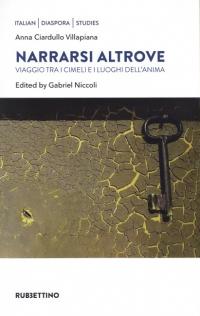 Link to Catalogue
Link to Catalogue
|
Anna Ciardullo, Villapiano. Narrarsi Altrove: Viaggio Tra I Cimeli E Luoghi Dell'anima. Edited by Gabriel Niccoli. Soveria Mannelli, IT: Rubbettino, 2023. "...often viewed as the voice of memory, or even as the material place of memory, within the silence of diaspora, the diasporic object is forged by our poet into a cultural icon capable of preserving and rewriting the historical consciousness of its custodian's community. [...] Ciardullo Villapian's poetry is thus able to save these objects from the encroaching postmodern spectre of disquiet and obsolescence with its ensuing inalterable oblivion. The object becomes as well for her, as indeed it is for its keepers, a metaphor for literature. In the sense that even if we are no longer able to visit the object's initial place, its roots, its original spark, we can still tell a story about it, we can still make it live through language and narrative. And that is literature..." -- Book cover. |
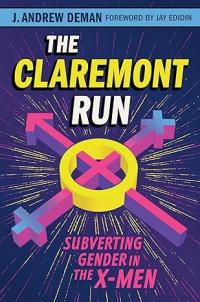 Link to Catalogue
Link to Catalogue
|
Deman, J. Andrew. The Claremont Run: Subverting Gender in the X-Men. Austin, TX: University of Texas Press, 2023. By the time Chris Claremont's run as author of Uncanny X-Men ended in 1991, he had changed comic books forever. During his sixteen years writing the series, Claremont revitalized a franchise on the verge of collapse, shaping the X-Men who appear in today's Hollywood blockbusters. But, more than that, he told a new kind of story, using his growing platform to articulate transgressive ideas about gender nonconformity, toxic masculinity, and female empowerment. J. Andrew Deman's investigation pairs close reading and quantitative analysis to examine gender representation, content, characters, and story structure. The Claremont Run compares several hundred issues of Uncanny X-Men with a thousand other Marvel comics to provide a comprehensive account of Claremont's sophisticated and progressive gender politics. Claremont's X-Men upended gender norms: where female characters historically served as mere eye candy, Claremont's had leading roles and complex, evolving personalities. Perhaps more surprisingly, his male superheroes defied and complicated standards of masculinity. Groundbreaking in their time, Claremont's comics challenged readers to see the real world differently and transformed pop culture in the process. [Source: Amazon.ca] |
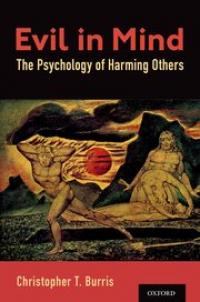 Link to Catalogue
Link to Catalogue
|
Burris, Christopher T.. Evil in Mind: The Psychology of Harming Others. New York, NY: Oxford University Press, 2022. What is evil? Who does evil things? Who is evil? How do you know? Whether in response to witnessing mass suffering or feeling the sting of personal injustice, people confidently apply the "evil" label to perpetrators and the harm that they inflict, yet evil's essence remains mysterious to many. This book offers readers an accessible, social-scientific definition and analysis of evil in its various incarnations to foster a sophisticated and self-reflective understanding of the phenomenon, departing from ghoulish or self-righteous generalizations. Part 1 explores why most of us want to be seen as good, when and why we deem something evil, and what psychological and environmental factors increase our propensity for harming others in spite of our drive for social acceptance. Part 2 presents illustrative examples of how Part 1's insights can be applied, specifically examining hate, sadism, serial killers, group-based atrocities, organizational offenses, and familial abuse. The concluding chapter amplifies and integrates the book's big themes to foster a more mindful, informed confrontation of the elusive problem we call evil. [Source: Publisher's website] |
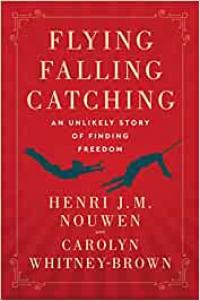 Link to Catalogue
Link to Catalogue
|
Nouwen, Henri J.M., and Carolyn Whitney-Brown. Flying, Falling, Catching: An Unlikely Story of Finding Freedom. Toronto, ON: HarperCollins, 2022. During the last five years of his life, best-selling spiritual author Henri J. M. Nouwen became close to The Flying Rodleighs, a trapeze troupe in a traveling circus. Like Nouwen’s own life, a trapeze act is full of artistry, exhilarating successes, crushing failures and continual forgiveness. He wrote about his experience in a genre new to him: creative non-fiction. In Flying, Falling, Catching, Nouwen's colleague and friend Carolyn Whitney-Brown presents his unpublished trapeze writings framed by the true story of his rescue through a hotel window by paramedics during his first heart attack. Readers will meet Nouwen as a spiritual risk taker who was transformed through his engagement with these trapeze artists, as well as his participation in the Civil Rights movement, his life in community with people with intellectual disabilities, his personal growth through friendships during the 1990s AIDS pandemic, and other unexpected encounters. What will we do with our lives, and with whom will we do it? In this story of flying and catching, Nouwen invites us all to let go and fly, even when we are afraid of falling. [Source: Amazon.ca] |
 Link to Catalogue
Link to Catalogue
|
Snyder, Carrie . Francie's Got a Gun. Toronto, ON: Alfred A. Knopf Canada, 2022. On a June afternoon in a small city, a wild-eyed girl named Francie dashes down a neighbourhood street, clutching a gun. She doesn’t know exactly what she’s running from, and she doesn’t know what she’s heading towards. All she understands is the need to survive. To save herself, she has no choice but to run—and to save those she loves, she must hold tight to that gun. Swirling around Francie is a chorus of friends, family, and neighbours, each person with a different view of her. As we hear from these voices—Francie’s steadfast best friend, Alice; Alice’s comically unaware mother, Sally, and struggling mathematician father, David; Francie’s distressed and distracted mother, Marietta, and troubled, unwell father, Luce—a fractured portrait emerges of the girl and the village surrounding her. And at last we arrive at a still point in the chaos: a tall tree where Francie takes shelter, and where the meaning of her flight—for herself, and for the people around her—becomes clear. [Source: Penguin website] |
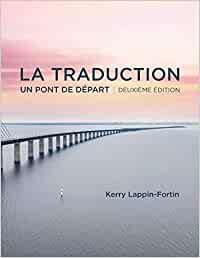 Link to Catalogue
Link to Catalogue
|
Lappin-Fortin, Kerry. La Traduction: Un Point de Départ. Second edition. Toronto, ON: Canadian Scholars, 2022. Cette deuxième édition augmentée de La traduction : un pont de départ propose une introduction intéressante et vivante à la traduction anglais-français et français-anglais. Organisée en trois parties, elle présente les notions de base linguistiques pertinentes, les procédés, les types et les défis de la traduction et un chapitre sur les différences structurelles des deux langues. Les mises à jour de cette édition comprennent des informations supplémentaires sur des sujets liés aux sociolectes, aux sous-titres et au langage inclusif. Dans ce manuel « hybride », le contenu théorique s’accompagne d’exercices pratiques à la fois utiles et divertissants, dont du nouveau matériel secondaire. Destiné principalement aux étudiants universitaires de niveau intermédiaire-avancé en français langue seconde, il convient bien à un premier ou à un deuxième cours de traduction, voire à un cours de stylistique comparée. [Source: Amazon.ca] |
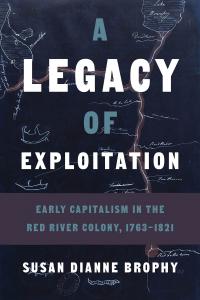 Link to Catalogue
Link to Catalogue
|
Brophy, Susan. Legacy of Exploitation: Early Capitalism in the Red River Colony, 1763-1821. Vancouver, BC: UBC Press, 2022. It is unlikely that buyers of the Hudson’s Bay Company’s “iconic multistripe” point blanket these days reflect on the historically exploitative relationship between the company and Indigenous producers. This critical re-evaluation of the company’s first planned settlement at Red River uncovers that history. As a settler-colonialist project par excellence, the Red River Colony was designed to undercut Indigenous peoples’ troublesome” autonomy and better control their labour. Susan Dianne Brophy upends standard historical portrayals by foregrounding Indigenous peoples’ autonomy as a driving force of change. A Legacy of Exploitation offers a comprehensive account of legal, economic, and geopolitical relations to show how autonomy can become distorted as complicity in processes of dispossession. Ultimately, this book challenges enduring yet misleading national fantasies about Canada as a nation of bold adventurers. [Source: Chapters] |
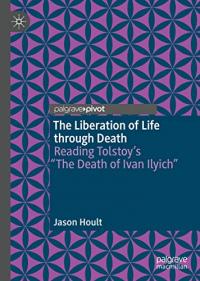 Link to Catalogue
Link to Catalogue
|
Hoult, Jason. Liberation of Life Through Death: Reading Tolstoy's "The Death of Ivan Illyich". Cham, Switzerland: Palgrave Macmillan, 2022. This book undertakes to show how the exercise of reading Tolstoy’s “The Death of Ivan Ilyich” involves articulating for ourselves, as readers, what it means to liberate life through death. What Tolstoy’s short story shows us, the author argues, is that life can be truly liberated through death only when we see that death is neither a supernatural event nor a natural end but involves a work of love. In Part 1 of his study, the author addresses the common assumptions that give rise to the idea that religious and secular views of life and death are opposed in modernity. He also examines the history of values that Tolstoy’s story embodies. In Part 2, he analyses the life and death of Ivan Ilyich in order to show that the values that are embedded in Tolstoy’s story are at once religious and secular. [Source: Amazon.ca] |
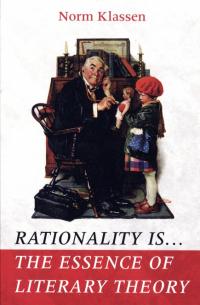 Link to Catalogue
Link to Catalogue
|
Klassen, Norm. Rationality is...: The Essence of Literary Theory. Eugene, OR: Cascade Books, 2022. "A culturally influential sub-discipline within literary studies, literary theory has developed in parallel form in other arts and social science disciplines, so that one might refer to 'cultural theory' or 'social theory' as well, or even just to 'theory'. It's as familiar as the word 'postmodern' and as tricky as 'deconstruction'. What is it about? What is at stake? Theory is about rationality. This book's title invites two different interpretations of what it might mean to say so. For many, the essence of literary theory is the unmasking and redescription of rationality in other terms. Put ironically, rationality is male; rationality is white; rationality is repression. The book's title, however, can also be read in a second way. On this reading, rationality itself is the essence of literary theory and central to literature, art, and society. Certain conceptions of what it entails can be problematic; the critique in the first way of reading the title remains relevant. Yet one can affirm rationality as integral to human flourishing, including the processes of producing, analyzing, and enjoying literature, art and culture. This book provides readers with a clear overview of theory's development and the abiding presence of its concern with the status of rationality across its forms" -- Book cover. |
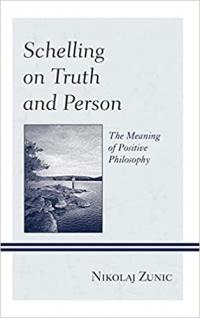 Link to Catalogue
Link to Catalogue
|
Zunic, Nikolaj. Schelling on Truth and Person: The Meaning of Positive Philosophy. Lanham, MD: Lexington Books, 2022. Positive philosophy is the name that Friedrich Schelling (1775-1854) gave to a new type of philosophizing that stands in contrast to the so-called negative philosophy that is predominant in modern rationalism. But what exactly is positive philosophy? Schelling on Truth and Person: The Meaning of Positive Philosophy argues that its meaning lies in a distinctive view of the human person as a seeker of truth. Truth is presented as historically woven in the movement of life with the phenomena of mythology and religion that reveal the human being's falling away from and return to the truth. Nikolaj Zunic demonstrates that this novel understanding of truth accompanies the development and expression of positive philosophy itself. The anthropological dimension of truth relates to self-knowledge, the soul, spirit, and personality, and Schelling's positive philosophy sheds light on the grand themes of the meaning of life, the ontological question (why is there something rather than nothing?), the enigma of knowledge and reason, and the affirmation of the existence of God. This book will appeal to students and scholars interested in Schelling's late philosophy as well as broader questions in philosophy concerning meaning, truth, human nature, and rationality. [Source: Book cover] |